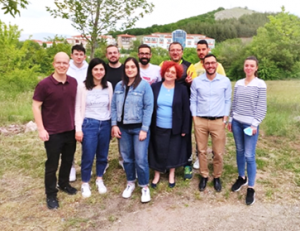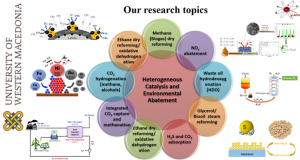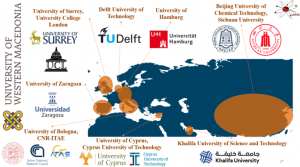LAFEC
WE WHO ARE
The Laboratory of Alternative Fuels and Environmental Catalysis (LAFEC), is attached to the Department of Chemical Engineering, of the of the University of Western Macedonia (UOWM). The laboratory was established in September 2005. Its director is Professor Dr. Maria Goula.
OUR TEAM
Prof. Maria A. Goula (Laboratory Director), mgoula@uowm.gr
Dr. Nikolaos Charisiou (Senior Researcher), ncharisiou@uowm.gr
Dr. Georgios Siakavelas (Post Doctoral Researcher), g.siakavelas@uowm.gr
PhD Candidates:
Miss Angeliki Latsiou
Mr Konstantinos Marmanidis
Mr Georgios Theodoridis
Mr Antonios Kikis
Mr Ioannis Kontodimos
A note on our Director
Prof. M.A. Goula is author of more than 90 research publications in Peer Reviewed International Journals with a total Impact Factor= 622.581 and average IF/paper= 6.995, which have received over 3300 citations, giving her a Hirsch (h)–index= 32.
Prof. M.A. Goula has acted as Coordinator, Team Leader or Senior Researcher in six (6) European, sic (6) territorial (3 Greece-UAE, 2 Greece-China, 1 Greece-FYROM), 12 National, four (4) Industrial and two (2) Internal funds R&D projects. The total budget of the projects in which she has acted as Coordinator or Team Leader is >2,000,000€.
Prof. M.A. Goula has developed a solid collaboration network with leading Universities and Research Institutions in Greece and abroad. Particular emphasis should be placed at the network she has built with Technical University of Delft (TUD), the University of Hamburg (UHH) and the Khalifa University (KU) as these world-renowned universities provide access to advanced laboratory equipment such as .

OUR RESEARCH
LAFEC’s main research interests are focused in the fields of Heterogeneous Catalysis, and especially, in materials synthesis and characterization, catalyst development and evaluation, and investigation of reaction kinetics and mechanisms. Of particular interest is the investigation of the surface chemistry and structure of dispersed metallic systems and of reducible metal oxides and their mixtures. Materials are characterized using a combination of physicochemical techniques, including selective chemisorption of probe molecules, temperature programmed desorption, reduction and oxidation (TPR, TPO and TPD), FT-IR, Raman, XPS and XRD. In parallel to catalyst development and testing, fundamental studies are made to identify the surface parameters, which determine the catalytic performance. Identification of reaction pathways and mechanisms is accomplished with the combined use of in situ FT-IR spectroscopy and transient mass spectrometry, including steady-state isotopic transient kinetic analysis (SSITKA).
- Primary goals in the field of Heterogeneous Catalysis are:
- Production of hydrogen by reformation of biomass-derived components and derivatives.
- Development of catalytic materials for the selective methanation of CO2 in reformate gas
- Development of catalytic materials for the selective hydrogenation of CO2 for the production of higher alcohols
- Oxidation of volatile organic compounds (VOC) over metal and metal oxide catalysts.
- Development of novel catalysts for the selective reduction of NOx present in the exhaust of lean-burn and diesel engines.

OUR PUBLICATIONS (Indicative)
- Rudolph B., Tsiotsias A., Ehrhardt B., Gross S., Dolcet P., Haas S., Charisiou N.D., Goula M.A., Mascotto S.*, Nanoparticle exsolution from nanoporous perovskites for highly active and stable biogas dry reforming catalysts. Advanced Science (2023) 2205890 (IF = 17.521)
- Tsiotsias A., Charisiou N.D., Harkou E., Hafeez S., Manos G., Constantinou A.*, AlKhoori A., Sebastian V., Hinder S.J., Baker M.A., Polychronopoulou K., Goula M.A.*, Enhancing CO2 methanation over Ni catalysts supported on sol gel derived Pr2O3-CeO2: En experimental and theoretical investigation. Applied Catalysis B: Environmental 318 (2022) 121836. (IF: 24.319)
- Tsiotsias A., Ehrhardt B., Rudolph B., Nodari L., Kim S., Jung W., Charisiou N.D., Goula M.A., Mascotto S.*, Bimetallic Exsolved Heterostructures of Controlled Composition with Tunable Catalytic Properties. ACS Nano 16 (2022) 8904-8916. (IF = 18.027).
- Liu C., Ji J., Wu W., Arhin S.G., Papadakis V.G., Goula M.A., Zhang S., Zhang Y., Wang W., Heterogeneous Catalyst–Microbiome Hybrids for Efficient CO-Driven C6 Carboxylic Acid Synthesis via Metabolic Pathway Manipulation, ACS Catal. (2022), 12, XXX, 5834–5845. (IF: 13.700)
- Sun H., Yang Z., Zhou L., Papadakis V.G., Goula M.A., Liu G., Zhang Y., Wang W., Calcium ion can alleviate ammonia inhibition on anaerobic digestion via balanced-strengthening dehydrogenases and reinforcing protein-binding structure: Model evaluation and microbial characterization, Bioresource Technology 354 (2022) 127165. (IF: 11.889)
- Yang Z., Sun H., Zhou L., Arhin S.G., Papadakis V.G., Goula M.A., Liu G., Zhang Y., Wang W., Bioaugmentation with well-constructed consortia can effectively alleviate ammonia inhibition of practical manure anaerobic digestion, Water Research 215 (2022) 118244. (IF: 11.236)
- Tsiotsias A., Charisiou N.D., AlKhoori A., Gaber S., Stolojan V., Sebastian V., Hinder S.J., Baker M.A., Polychronopoulou K., Goula M.A.*, Optimizing the oxide support composition in Pr-doped CeO2, towards highly active and selective Ni-based CO2 methanation catalysts. Journal of the Energy Chemistry 71 (2022) 547-561. (IF = 13.599)
- Tsiotsias A., Charisiou N.D.*, AlKhoori A., Gaber S., Sebastian V., Hinder S.J., Baker M.A., Polychronopoulou K., Goula M.A.*, Towards maximizing conversion of ethane and carbon dioxide into synthesis gas using highly stable Ni/perovskite catalysts. Journal of CO2 Utilization 61 (2022) 102046. (IF: 8.321)
- Douvartzides S.*, Charisiou N.D., Wang W., Papadakis V.G., Polychronopoulou K., Goula M.A.*, Catalytic Fast Pyrolysis of Agricultural Residues and Dedicated Energy Crops for the Production of High Energy Density Transportation Biofuels. Part II: Catalytic Research. Renewable Energy 189 (2022) 315 (IF: 8.634)
- Polychronopoulou K.*, Dabbawala A., Sajjad M., Singh N., Anjum D.H., Baker M.A., Charisiou N.D.*, Goula M.A., Hydrogen production via steam reforming of glycerol over Ce-La-Cu-O ternary oxide catalyst: An experimental and DFT study. Applied Surface Science 586 (2022) 152798 (IF = 392)
BRIEF SUMMARY OF RESEARCH ACHIEVEMENTS
- Advanced catalyst synthesis:
Catalyst synthesis is a topic that is often overlooked in the heterogeneous catalysis academic circles, where simpler catalyst formulations with inferior performance are often used. However, the use of more sophisticated synthetic procedure can greatly improve the desirable catalyst properties (surface chemistry, metal dispersion etc.), boosting the catalytic performance. Our team has applied novel synthesis methods, including Pechini sol-gel, microwave sol-gel and hydrothermal synthesis using batch reactors to prepare novel catalysts with superior catalytic activity, in collaboration with Khalifa University (KU, Prof. K. Polychronopoulou) and the University of Hamburg (UHH, Prof. S. Mascotto). In short, microwave irradiation was found to improve metal dispersion and catalyst homogeneity, Pechini sol‑gel to tune the pore structure and volume, while hydrothermal synthesis to yield desirable metal‑oxide nanostructures (e.g., nanorods, nanocubes). Moreover, the nanoparticle exsolution approach has been applied to create intermetallic Fe-Ni nanoparticles supported on a perovskite support with superior stability.
- Advanced catalyst characterization and in‑situ characterization:
Thorough catalyst characterization is very important, as it provides a way to examine the physicochemical and surface properties of the catalyst, establish structure‑function relationships for the respective reactions (i.e., which catalyst properties prove beneficial) and examine catalyst deactivation following long-term experiments. This provides a way to tune the catalyst synthesis, so that the catalyst has these desired properties, tailored for the reaction at hand. Moreover, in‑situ characterization offers the possibility to observe the reaction intermediate surface species and shed light to the reaction mechanism. However, many of these sophisticated characterization techniques require very expensive equipment and large facilities, which are mostly unavailable to Greek institutions. Through the deep collaboration with the aforementioned institutions KU and UHH, along with the Technical University of Delft (TUD, Prof. A. Bansode), Prof. Goula’s team will be granted access to such facilities and equipment (e.g., beamtime in synchrotron facilities and high-pressure in-situ DRIFTS equipment), in order to perform thorough catalyst characterization.
- CO2 hydrogenation reactions:
CO2 utilization is a core EU green new deal challenge. Our has demonstrated expertise working on CO2 hydrogenation for CH4 production. The most significant findings were that modification of the CeO2-based supports in Ni/CeO2 catalysts with aliovalent dopants, and in particular Praseodymium, can improve the defect chemistry and oxygen lability of the support and even the metal dispersion. Moreover, the synthesis method was also deemed very important, as the generation of high porosity was necessary for the formation of Ni nanoparticles of the desired size. The CO2 methanation mechanism was also investigated via in-situ DRIFTS, in collaboration with TUD and it was found to follow the formate route. Lastly, the team also has expertise on the integrated CO2 capture and hydrogenation process via dual-function materials (DFMs).
- High-pressure reactions:
Expertise in the handling of high‑pressure reactor systems, since CO2 hydrogenation to higher alcohols and hydrocarbons requires high pressure to operate. Our team has demonstrated such expertise in relevant reactions including the hydrogenation of waste oils for green diesel production and the hydrocracking of heptane. Relevant equipment for gas and liquid product analysis (GC and GC-MS) are also used for the reaction at hand.
RESEARCH GRANTS (Last 5 years)
| Project Title | Funding source | Period | Role |
| Award to the Partner for the Research Center activity (Grant number: 80499; Budget 30,000€) | Khalifa University | 2021-2024 | Project Coordinator |
| Across Border Educational and Technological innovation Hot-Spots (MIS: 5067261; Budget 1500,000€ for LAFEC/UOWM) | INTERREG IPA | 2022-2023 | Project Coordinator |
| Development of new and novel energy technologies with a low carbon footprint towards the reinforcement of the research and innovation infrastructure in the region of Western Macedonia” (MIS: 5047197, Budget 270,000€, for LAFEC/UOWM) | General Secretariat for Research & Innovation | 2020-2023 | Team Leader |
| Development of new catalysts for efficient de-NOX abatement of automobile exhaust purification (MIS: 5049162; Budget 140,000€, for LAFEC/UOWM) | Greece – China Joint RT&D Projects, General Secretariat for Research & Innovation | 2019-2023 | Partner, Team Leader |
| Integrated management and exploitation of multi-dispersed agricultural residues – application to energy production (MIS: 5049161; Budget 150,000€ for LAFEC/UOWM) | Greece – China Joint RT&D Projects, General Secretariat for Research & Innovation | 2019-2023 | Partner, Team Leader |
| A novel process for the efficient and eco-friendly valorization of biogas and CO2 emissions: Complete conversion to ethylene (MIS: 5030311; Budget 240,000€ for LAFEC/UOWM) | Research-Create-Innovate, General Secretariat for Research & Innovation | 2018-2022 | Partner, Team Leader |
| Green diesel production via selective de-oxygenation of algal oil using innovative catalytic systems (MIS: 5050170; Budget 50,000€) | Support for researchers with a focus on new researchers, Hellenic Foundation for Research & Innovation | 2019-2022 | Project Coordinator |
| Syntheis, characterization and testing of novel catalytic systems for the production of methane utilizing CO2 emissions (Grant number: 71314; Budget 10,000€) | University of Western Macedonia | 2019-2021 | Project Coordinator |
| Award to the Partner for the Research Center activity (Grant number: 70271; Budget 20,000€) | Khalifa University | 2018-2021 | Project Coordinator |
OUR NETWORK
Europe
- University of Hamburg, Germany ( Prof. Simone Mascotto)
- TU Delft, Holland ( Prof. Atul Bansode)
- University College London, UK ( George Manos)
- University of Surrey, UK ( Mark A. Baker)
- University of Zaragosa, Spain ( Victor Sebastian)
- University of Cyprus, Cyprus ( Angelos Efstathiou)
- Cyprus University of Technology, Cyprus ( Prof. Achilleas Constantinou)
- University of Bologna, Italy ( Nikolaos Dimitratos)
- University of Milano, Italy ( Prof. Alberto Villa)
- National Research Council of Italy, Italy ( Antonio Vita)
Asia
- Beijing University of Chemical Technology, China ( Guangqing Liu, Prof. Wen Wang)
- Sishuan University, China (Prof. Wei Chu)
- University of Shanghai for Science and Technology, China (Prof. Binlin Dou)
Middle East
- Khalifa University of Science and Technology, UAE ( Kyriaki Polychronopoulou)
- Kuwait Institute for Scientific Research, Kuweit ( Sultan Al-Salem)

EDUCATION
- Instrumental Chemical Analysis, Lectures and Lab Exercises, 3nd semester https://eclass.uowm.gr/courses/CHEMENG170/
- Physical Chemistry II , Lectures and Lab Exercises, 4th semester, https://eclass.uowm.gr/courses/CHEMENG194/
- Chemical Engineering Laboratory II, Lab Courses, 7th semester, https://eclass.uowm.gr/courses/CHEMENG218/
- Air Quality Engineering, Lectures, 8th semester, https://eclass.uowm.gr/courses/CHEMENG241/
- Catalytic Processes, Lectures, 8th semester, https://eclass.uowm.gr
- Heterogeneous Catalysis, 9th semester, https://eclass.uowm.gr
- CO2 Capture and Utilization Technologies, 9th semester, https://eclass.uowm.gr
CONTACT
Email:
Telephone:
+30 24610 56651 (Office) and 56612 (laboratory)
Postal Address:
(To: Maria A. Goula)
University of Western Macedonia
Department of Chemical Engineering
Laboratory of Alternative fuels and Environmental Catalysis
ZEP, Kozani, 50100, Greece
